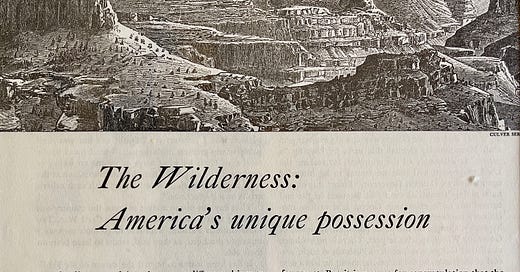When I was a kid, my grandparents subscribed to a publication of US history called American Heritage, which was a sort of hybrid, neither fish-nor-fowl hardback “magazine” more closely resembling a coffee table book than a periodical.
If you are a baby Boomer or Gen Xr, chances are you remember it, if for nothing else than as an artifact of some old relative’s house. Most folks kept their issues in their bookcases, which is exactly what my grandparents did.
One day, back when I was a 14-year-old burgeoning lover of nature writing (having recently discovered the works of Ed Abbey) I was at my grandparents looking through an old issue of American Heritage when I stumbled across the back page column you see in the photo.
It was a book excerpt, written by the famed writer, naturalist, and lover of the Southwest, Joseph Wood Krutch (who incidentally was an early influence on Abbey himself). The excerpt is from his book on the Grand Canyon, published in the early 60s.
Krutch, who was one of the mid-20th Century’s most prolific and important American environmental writers, seems to be almost totally forgotten these days, which is a shame, because he certainly belongs in that group that includes writers and thinkers such as Bernard DeVoto, John Graves, and Wallace Stegner.
Back then, however, I’d never heard of him. But his words describing the importance of wilderness to the forming of the American spirit and American soul, and how the presence of that wilderness so profoundly differentiates us from our European forebearers, had a profound impact on my young mind.
After my grandparents died I put that old copy of American Heritage in my own bookcase and carried it around for years. I would periodically take it out and re-read that passage as a sort of touchstone to the long-ago forming of my personal and political identity. And eventually I cut that page out of the magazine, put it in a frame, and hung it by my desk, where it hangs to this day.
Occasionally, on days when the news comes fast, furious, and usually bad, I will lean over and re-read that passage as a way to recalibrate my internal compass toward what really matters.
I won’t retype the entire passage here, but I’ve made the photograph large enough to read, and I encourage you to do so, because it so perfectly explains what we are in danger of losing right now.
I just returned from a two-week trip helping my wife shepherd a group of her students across Europe. It’s a fantastic way for young, rural American kids to see firsthand what they learn in the classroom (my wife teaches humanities), to experience and appreciate the wider world, and to hopefully help them understand their own place within it.
And it gives me a chance to revisit the places and cultures I fell in love with on my own first visit to Europe long ago.
But every time I visit Europe, the words that Krutch wrote all those years ago are never far from my mind. Our public lands are indeed America’s unique possession. There is nothing quite like them in the world. And every time I return from Europe, I feel the threats to that unique American possession drawing closer, and more menacing than before.
While I was in Europe, news broke that the senate version of the budget bill had not only reinstated the selling of public lands, but had dramatically enlarged how much would go on the chopping block to be sold off to the highest, richest, most powerful among us.
And I cannot help but wonder on that fundamental question posed by Krutch all those years ago: If we allow those who would eagerly sell off that which makes us who we are, the question begs, who will we become? Just how much of our collective Americanness are we willing to give up in order to sate the greed of the few?





"of the people, by the people, for the people"...nah, just for the unjust enrichment of corporations. Perhaps I'll go on another list (besides my already existing FBI file) by suggesting a Monkey Wrench Gang revival.